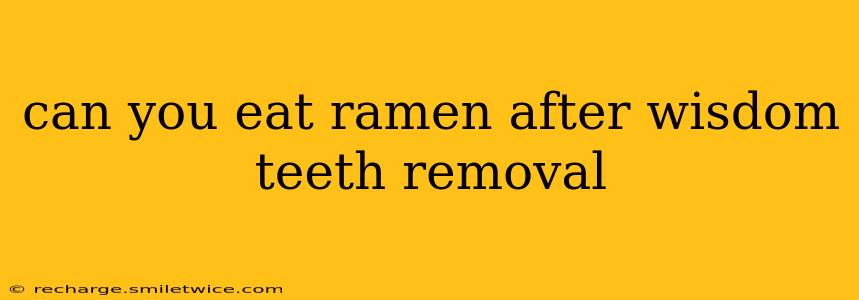Can You Eat Ramen After Wisdom Teeth Removal? A Guide to Post-Surgery Diet
Having your wisdom teeth removed is a significant oral surgery, and the recovery process requires careful attention to your diet. Many people wonder about specific foods, and ramen, with its comforting broth and noodles, often comes up. So, can you eat ramen after wisdom teeth removal? The answer is: it depends. Let's explore this in more detail.
Understanding the Post-Wisdom Tooth Removal Diet
The key after wisdom teeth extraction is to avoid anything that could disrupt the healing process or cause complications. This means avoiding foods that:
- Are too hard: These could dislodge blood clots, leading to dry socket (a painful condition). Think hard candies, chips, nuts, etc.
- Are too hot: Extremely hot foods can irritate the surgical site and increase bleeding.
- Require excessive chewing: This could put pressure on the extraction sites and cause pain or bleeding.
- Are abrasive: Anything that scrapes against the healing gums should be avoided.
Can You Eat Ramen? A Careful Consideration
Ramen, in its various forms, presents a mixed bag. Let's break it down:
The Broth: The broth itself is generally fine as long as it's not too hot. Lukewarm or cool broth can provide much-needed hydration and nutrients. However, be cautious of overly salty broths, as excessive sodium can cause inflammation.
The Noodles: This is where things get tricky. Ramen noodles, particularly when cooked al dente, can be slightly too firm and difficult to manage in the early stages of recovery. You want to avoid anything that requires substantial chewing. If the noodles are incredibly soft and easily mashed, they might be okay, but it's a judgment call based on your individual healing progress and pain tolerance. Consider breaking the noodles into smaller pieces to minimize chewing.
Toppings: Stay away from crunchy toppings like fried onions, seasoned eggs, or anything that could get lodged in the extraction sites. Soft, easily mashable toppings like very well-cooked vegetables are preferable, if you can handle them.
What about different types of ramen?
The type of ramen will influence whether it’s suitable after wisdom teeth removal. Instant ramen often features very thin noodles, which may be easier to manage than thicker, chewier noodles found in restaurant-style ramen. However, the texture of the noodles might still be too firm.
When can I start eating ramen after wisdom teeth removal?
This depends largely on your individual healing progress and your surgeon's instructions. Typically, you'll start with very soft foods like broth, applesauce, yogurt, and pudding during the first few days post-surgery. Gradually, you can introduce slightly more textured foods as the pain subsides and your gums heal. You might be able to tolerate softer ramen noodles after a week or so, but this is not a hard and fast rule.
What are some better alternatives for post-wisdom tooth removal meals?
Focus on soft, easily digestible foods such as:
- Smoothies: Packed with nutrients and easy to consume.
- Soups (broth-based): Ensure they are not too hot or spicy.
- Mashed potatoes: A classic soft food.
- Scrambled eggs: Cooked until very soft.
- Yogurt: A good source of protein.
- Applesauce: Smooth and easily digestible.
Should I consult my dentist or oral surgeon?
Always follow your dentist or oral surgeon's post-operative instructions meticulously. They can provide the most tailored advice based on your specific case and healing progress. If you're unsure about any food, it's always best to err on the side of caution and ask your surgeon or dentist. Don't jeopardize your healing process for a bowl of ramen.
In short, while the broth might be acceptable, the noodles and toppings in ramen can be problematic after wisdom teeth removal. Prioritize soft, easily digestible foods during your recovery to ensure a smooth healing process. Always consult your dental professional for personalized dietary advice.
